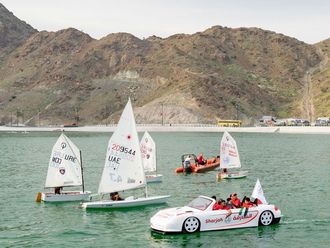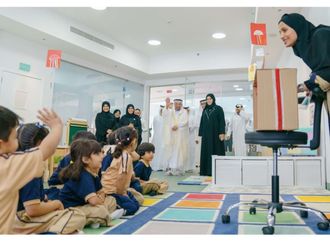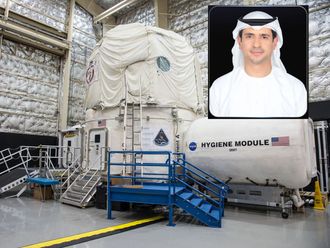Sheikh Hamdan bin Zayed Al Nahyan, the Minister of State for Foreign Affairs and Deputy Chairman of the Environmental Research and Wildlife Development Agency (ERWDA), has issued a new regulation for contracting companies to get permission from ERWDA before starting work.
The aim is to ensure the preservation of archaeological and protected environmental sites in the emirate.
A letter containing the new regulation has been sent to the Abu Dhabi Public Works Department, the Supreme Petroleum Council (ADNOC), the Abu Dhabi Municipality and Planning Department and the Ruler's Representative in the Western Region for implementation.
The new regulation requires all authorities and contracting companies to get an official permission from the ERWDA and the Abu Dhabi Islands Archeological Survey (ADIAS) for any construction plans involving excavation.
The work, according to officials, will be approved by ERWDA after an investigation by both ERWDA and ADIAS of the site where construction work is proposed.
The release of the new regulation was confirmed by General Majid Al Mansouri, ERWDA's Deputy Secretary.
The new regulation was triggered by trench digging at one of the country's most important sites on Dalma Island in Abu Dhabi's Western Region.
According to reports, the Municipality started digging a trench that affected the oldest settlement in the country, which is 7,000 years old, on Dalma Island at the beginning of this month.
On the instructions of Sheikh Hamdan ADIAS sent a team to inspect the site to ensure that the digging stopped and the site was protected.
In 1998, an ADIAS team carrying out follow up investigation at an ancient site on Dalma Island found a 7,000-year-old bowl made of plaster. The bowl, so far only one of its kind found in the entire eastern Middle East region, is now being analysed by the British Museum in London.
Dr Mark Beech, ADIAS Field Director for investigation, said a two-member team headed by him discovered the unique bowl at an Ubaid settlement site on the premises of the Women's Association complex on Dalma Island.
According to Beech, he and his colleague Jakub Czastka identified the object as being the most complete of its type discovered in the region.
"Under the new regulation, any construction plans involving digging must be submitted to ADIAS and ERWDA for approval," ADIAS Executive Director Peter Hellyer told Gulf News.
He said ADIAS and ERWDA have been working together to protect archaeological sites, fossils and protected environmental areas.
ADIAS, established on the instructions of President His Highness Sheikh Zayed bin Sultan Al Nahyan and under the patronage of Sheikh Mohammed bin Zayed Al Nahyan, the Chief of Staff of the Armed Forces, is responsible for works archaeological sites and fossils on Abu Dhabi's coastlines and islands and in other parts of the Western Region.
Said Hellyer: "We are very grateful to Sheikh Hamdan for his swift initiative to strengthen and protect archaeology and fossil sites ADIAS is working very closely with ERWDA to ensure that the protection of the national heritage and environment go side by side.
"Together ADIAS and ERWDA will be discussing with other government departments how to prepare ways in which the needs of developments can be handled in such a way that the national heritage and the environment are also preserved."
He added that ADIAS was planning to undertake further work on Dalma Island before the end of the year.
New regulation on construction work
Sheikh Hamdan bin Zayed Al Nahyan, the Minister of State for Foreign Affairs and Deputy Chairman of the Environmental Research and Wildlife Development Agency (ERWDA), has issued a new regulation for contracting companies to get permission from ERWDA before starting work.












